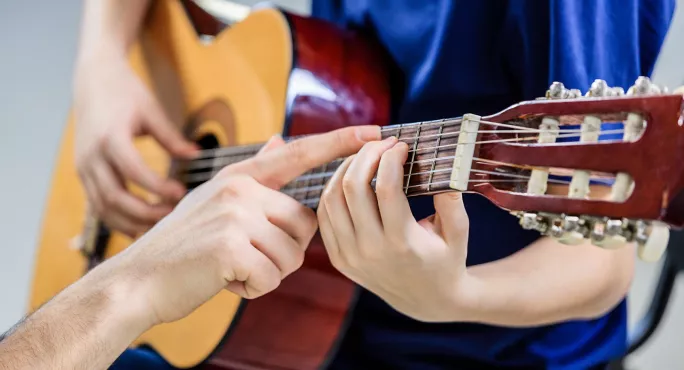Free music tuition continues in Scotland, but demand not met

Free instrumental music tuition will be offered in Scotland for the third year in a row in 2023-24, it has been confirmed - but a separate report shows that the service remains under huge strain.
In July 2021, the Scottish government and local authorities body Cosla announced a one-year funding agreement of more than £7 million to remove tuition fees for 2021-22. The Scottish Budget 2022-23 provided £12 million to remove music tuition charges, and the 2023-24 Budget, published in December, has now confirmed that another £12 million will be made available for that year.
However, the latest annual report on the state of instrumental music tuition in Scotland, published by local government organisation the Improvement Service, shows that only four local authorities have been able to provide lessons to all interested pupils and that it is too early to gauge the impact on pupil numbers of removing fees.
- Context: Instrumental music tuition fees to be scrapped
- One year ago: Scrapping fees alone won’t keep the music playing in schools
- Related: Minister insists funding for Youth Music Initiative is ‘secure’
The Improvement Service report, Instrumental Music Services: Results from the IMS Survey 2022, finds that despite the Scottish government funding, “there are still large financial pressures on instrumental music services with operational costs rising”.
It adds: “There still appears to be a lot of unmet demand, with only four local authorities [out of 32] able to provide lessons to all interested pupils.”
Pupils who claim free school meals remain underrepresented, while full-time instructors “increased very slightly but remain historically low” and there was a “large increase” in part-time instructors.
The report says “it is too early to assess the impact of the removal of tuition fees on pupil numbers”, although overall numbers learning to play a musical instrument have “rebounded to pre-pandemic levels”.
“It remains clear that instrumental music services remain popular and widely accessed,” it states, with 56,138 pupils (more than 8 per cent of the school roll in Scotland) and almost 11 per cent of all pupils in Primary 5 and above receiving lessons at some point in 2021-22. At least 10,329 pupils also participated in “additional” music activities.
Yet, the Covid-19 pandemic continued to have an impact, “often making holding lessons face-to-face more difficult”.
Many councils have carried on with online learning and adopted a hybrid model, using platforms such as Google Classroom, Microsoft Teams, Seasaw and ClassDojo, “meaning lessons could continue to be delivered where they may have otherwise been missed.” The report praises the “enormous levels of commitment, hard work and willingness to adapt to the new circumstances” among staff in instrumental music services.
The report finds improvements in some places that embraced digital technology during the pandemic. In Angus, for example, technology helped offer music tuition more widely in rural primary schools. In East Renfrewshire, weekly “virtual string orchestras” allowed pupils from different schools to meet up regularly.
However, there is a warning that music services may have to be whittled down if the Scottish government at some point decides to stop funding free instrumental tuition beyond the current commitment up to and including 2023-24 (or to provide insufficient funding).
There has been “rising demand as a result of the removal of fees”, yet “capacity to deliver instrumental music tuition has already been in decline for several years”. And, with the raising of money through local fees no longer an option, if national funding is too low or non-existent, the report warns that the only option for councils in future years could be “the achievement of equivalent savings through reduction in service levels”.
The report’s conclusion states: “At a time when young people have faced unprecedented upheaval in their lives and a crisis in mental health outcomes, the invaluable role these [music] services play for young people’s personal wellbeing and development should not be forgotten.”
Just before Christmas, the EIS teaching union - while highlighting the £150,000 it has directed to educational arts projects over the past five years - warned that arts funding “has been increasingly squeezed” in recent times, and highlighted instrumental music.
EIS general secretary Andrea Bradley said: “One area of the curriculum that has been under particular threat in recent years is instrumental music provision. While the scrapping of charging for instrumental tuition was very welcome and long overdue, removing a barrier to access for many young people, the provision of instrumental music continues to be threatened in our schools - for purely budgetary reasons.
”Instrumental music is a vital part of the curriculum, helping young people to build confidence and team-working skills, in addition to developing their musical talents. It is essential that instrumental music tuition is properly supported in our schools.”
You need a Tes subscription to read this article
Subscribe now to read this article and get other subscriber-only content:
- Unlimited access to all Tes magazine content
- Exclusive subscriber-only stories
- Award-winning email newsletters
Already a subscriber? Log in
You need a subscription to read this article
Subscribe now to read this article and get other subscriber-only content, including:
- Unlimited access to all Tes magazine content
- Exclusive subscriber-only stories
- Award-winning email newsletters
topics in this article



